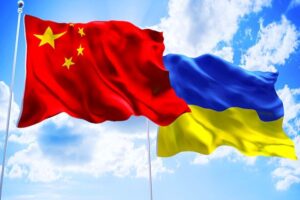
Ukraine and China are working on opening the Chinese market for Ukrainian peas, poultry meat, corn and fish products, the press service of the State Service for Food Safety and Consumer Protection said.
“China is an important market for agro-products for national exporters, therefore, on behalf of the Chairman of the State Consumer Service Sergiy Tkachuk, constant interaction between the service and the competent authority of the PRC continues. Our goal is to open seven new markets. This is a long-term process of coordination, but step by step we are succeeding,” said First Deputy Head of the State Consumer Service Oleg Osiyan at a meeting with representatives of the General Administration of Customs of the People’s Republic of China (GACC).
The parties discussed draft bilateral international agreements on export of peas, wheat flour, pet food, beef, corn, poultry meat, wild-caught aquatic products from Ukraine to China. Each of the above documents is at a different stage of elaboration and harmonization.
“While the protocol on peas is at the stage of finalization of domestic harmonization in Ukraine, the texts have been sent for consideration to the competent authority of China. This is one of the markets at the final stage of opening. After the signing of the bilateral protocol, new opportunities for Ukrainian agrarian business to export peas will open up,” Deputy Head of the State Consumer Service – Chief State Phytosanitary Inspector of Ukraine Vadym Chaykovskyy emphasized.
It is recalled that the last Ukrainian product, for which the access to the Chinese market was opened, was honey. The form of health certificate for its export was agreed earlier this year.
Requirements of the destination countries of the export of food products of animal and plant origin are publicized on the official web portal of the State consumer service.
“Currently under consideration of Chinese colleagues – draft protocols on the export of poultry meat and fish. The State Consumer Service sent its proposals on the text of the protocol in the fall. The protocol on wild-caught aquatic products has already undergone domestic harmonization and is at the stage of final approval by the Chinese side. The texts of protocols on beef and pet food are also undergoing the stage of domestic approval,” said Volodymyr Kusturov, Deputy Head of the State Consumer Service – Chief State Veterinary Inspector of Ukraine.
Representatives of the State Consumer Service and GACC discussed in detail the steps of further cooperation, draft bilateral agreements, and agreed to continue active cooperation on the development of international trade between Ukraine and China.

The Economic Court of Zaporizhzhya region on October 23, 2024 satisfied the statement of claim of the National Bank of Ukraine (NBU) and decided to open bankruptcy proceedings against Private JSC “Insurance Company ‘Oranta-Sich’. As reported on the website of the NBU, the announcement was made public on the official website of the Supreme Court. It is emphasized that creditors are obliged to submit to the Supreme Court written applications with claims against the debtor and supporting documents within 30 days from the date of official publication of the announcement on the opening of proceedings. This period is the deadline and is not subject to renewal.
As reported, on September 19, 2024 the NBU applied to IC “Oranta-Sich” a measure of influence in the form of attributing the insurer to the category of insolvent and canceled the license for insurance activities.
The reason for such a decision was the results of off-site supervision of the insurer’s activity, which established non-compliance with solvency requirements. So, as of July 1, 2024 the amount of acceptable regulatory capital for meeting the minimum capital requirements of IC Oranta-Sich is more than 50% less than the level of minimum capital, established by the regulatory legal acts of the regulator. Besides IC Oranta-Sich has not provided the plan submission within 15 days from the date of their detection.
According to the law “On Insurance”, the liquidation of the insurer in case of such decisions is carried out in accordance with the Code of Ukraine on bankruptcy procedures.
As reported, the shareholders of IC Oranta-Sich at the meeting on June 27 considered the issue of cessation of activities by fulfilling the insurance portfolio, approval of the exit plan. IC Oranta-Sich was registered in 1995.
Change in consumer prices in 2023-2024, %

Open4Business.com.ua

DW Akademie has been active in Ukraine since 2014, promoting freedom of expression, media viability and balanced reporting. It supports the public broadcaster in informing the population during the ongoing war.
The Ukrainian media landscape has changed fundamentally since the war broke out in February 2022. However, despite wartime censorship and additional restrictions on press freedoms, the country’s ranking has moved up significantly on Reporters Without Borders’ World Press Freedom Index. Ranked in 2022 at 106 out of 180 countries, it rose to position 79 in 2023 and to position 61 in 2024.
These higher rankings are mainly due to oligarchs losing their influence on the journalism and editorial policies of national TV stations. Their political and economic influence has declined sharply since the war began, and few public political disputes are now conducted via the media. As a result, oligarchs have lost interest in their own media (especially national TV channels) as platforms for political strife. This growing gap is being filled by Ukraine’s public broadcaster UA:PBC (Suspilne) and local media.
Nevertheless, ongoing reports jointly produced by and aired on six national TV channels, that are controlled by the president’s office and financed by the state budget, have undermined people’s trust in the media.
Observers point to two clear trends in the media market since 2022: people are moving away from television as their main source of information and towards social and online media (especially Telegram). At the same time, people’s trust in and the relevance of independent (online) media is growing. Although countering (Russian) disinformation is a major challenge as people increasingly consume news via (anonymous) Telegram channels, strengthening the relevance of local media in Ukraine is encouraged.
Our activities
DW Akademie has been active in Ukraine since 2014, supporting local independent media, public broadcasting (UA:PBC) and freelance journalism. Its ongoing projects help improve standards for journalistic qualifications and make basic and advanced training more practice oriented. It also provides comprehensive and needs oriented support to local independent media outlets.
Independent, reliable information is vital in times of war. As a result, the public broadcaster UA:PBC informs people about attacks, even if the alarm system is not working. DW Akademie keeps in close contact with its staff and partner organizations in Ukraine, including UA:PBC.
DW Akademie is supporting the project sponsor Ukrainian Institute for Media and Communication (UIMK) in developing training formats. The aim is to increase the media and digital skills of people over and to break old rigid ways of thinking. An accompanying study is analyzing the needs and ways to reach this target group. One example is for younger relatives to support older people in becoming more involved in social discourse and transformation processes.
Via the Journalism Teachers Academy (JTA), the UIMK offers training in methodology and didactics to teachers from Ukrainian university journalism faculties. The aim is for media outlets to draw from young better-trained media professionals. Cooperation is being planned with six Ukrainian universities.
The Educational Center Nakypilo continues to offer training positions that are practice-oriented and part of the School for Universal Editors (SUR) to enable trained editors to support staff at independent media outlets. The school’s financing is ensured through financial consulting and organizational development.
DW Akademie provides extensive support to local independent media outlets in Ukraine. It offers needs-oriented training for journalists and media managers as well as seminars and study trips to Germany to give space for discussions, reflection and networking. Together with “Maje Sens”, a new project partner and non-governmental organization, media managers will receive training and support in fundraising. The project runs from 2024-2025.
DW Akademie, together with the Ukrainian public broadcaster (Suspilne) and media organization Lviv Media Forum, is conducting the project “Strengthening Independent Media for a Strong Democratic Ukraine” (2024-2026). It is funded by the European Commission with the support from the German Federal Foreign Office.
The project aims to increase the long-term capacity of independent media, including the Ukranian public broadcaster, and promote an open constructive dialogue within the Ukrainian population. It also aims to support the National Council for Television and Radio Broadcasting as it strives to meet EU standards.
DW Akademie and Ukraine’s Lviv Media Forum are applying their expertise in supporting independent regional media in Ukraine, with a focus on niche media, constructive journalism and social participation. Suspilne is working more on investigative reporting and children’s content, and advancing its digital modernization process.
The project “MIL Initiative for Youth” by DW Akademie in partnership with Suspilne’s Public Academy Juniors is for young people (12-18 years old) and gives them a voice in local democratic processes.
Funding: German Federal Ministry for Economic Cooperation and Development (BMZ), German Federal Foreign Office (AA), European Commission (EU)
Program Directors: Dr. Kyryl Savin (BMZ), Hélène Champagne (EU)
Locations: Kyiv, Lviv, Cherkassy, Ternopil, Kharkiv, Odessa, Dnipro, Chernihiv, Mykolaiv, Dnipropetrovsk, Zaporozhye, Kherson, Mariupol, Donesk, Luhansk
Local Partners: Public Broadcasting Company of Ukraine UA:PBC (Suspilne), Educational Center Nakypilo, NGO “Maje Sens”, Ukrainian Institute for Media and Communication (UIMC),Lviv Media Forum (LMF)
Focus: Qualification and training for journalists, media viability, business journalism, civic participation (local), social participation, (local) participatory media formats and community media, media and information literacy (MIL), professionalism and journalist networks
https://akademie.dw.com/en/dw-akademie-in-ukraine/a-18549630
2022-2024 goods trade balance forecast (USD billion)

Open4Business.com.ua

The U.S. Treasury Department has published rules on its website designed to limit U.S. investment in technologies that could be used in the military of China and some other countries.
“Countries of concern are using U.S. investments in ways that could lead to accelerated development of sensitive technologies and products that undermine our national security interests,” the White House said in a statement on the publication of the rules.
The rules prohibit U.S. citizens from investing in technologies that could threaten America’s national security and require notifying the Treasury Department of a number of related transactions.
The White House noted that “the administration is committed to ensuring America’s security by preventing the People’s Republic of China from developing key technologies that are critical to modernizing its military.”
The rules mention semiconductors, microelectronics, quantum information technology, and artificial intelligence because these technologies could form the basis for new products in the military.
“U.S. investments, including intangible benefits such as management assistance and access to the investment and human resources networks that often accompany capital flows, should not be used to help interested countries develop their military, intelligence, and cyber capabilities,” said Assistant Treasury Secretary for Investment Security Paul Rosen, quoted by the Treasury Department.
China's technology, U.S. investments, U.S. Treasury Department